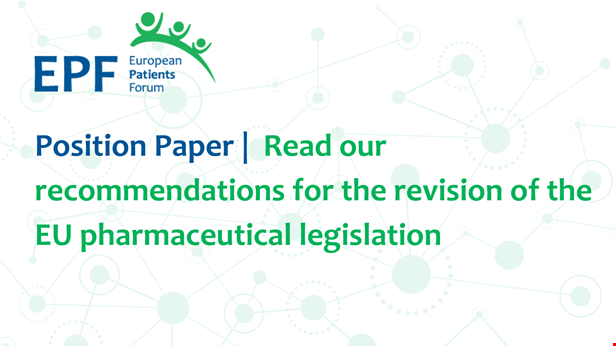The European Patients’ Forum calls for a patient-centred revision of the EU pharmaceutical legislation

EPF recommendations for the revision of the EU pharmaceutical legislation
The European Patients’ Forum (EPF) considers the recently published revision of the pharmaceutical legislation to be a unique opportunity to make the EU regulatory framework more patient-centric, aiming for equitable access to medicines. While the European Commission’s proposal includes some positive developments, more can be done to ensure that the legislation reaches its objectives. EPF calls for a patient-led definition of “unmet medical need”, a fair balance between patient access and R&D incentives, embedding patients’ participation across the medicines’ lifecycle, regulatory flexibilities to adapt to scientific process without compromising patient safety, and a focus on patients’ information.
This position paper reflects the feedback received by EPF through the consultation of its member organisations.
Medicines targeting patients’ needs
The legislative overhaul should ultimately ensure that patients benefit from medicines that bring added therapeutic value, a concept which is currently insufficiently and inconsistently defined across the lifecycle of new medicines. EPF believes that a common and meaningful European-wide definition of ‘added therapeutic value’ must be developed in partnership with patients, as only they know what added value means to them and to their condition.
Similarly, EPF is concerned about the definition of “unmet medical need” included in the Commission’s proposal, which undermines the core principle of patient-centricity and does not take into account criteria that matter to patients such as severity of disease, quality of life, and availability and appropriateness of existing treatments. EPF calls on EU institutions to ensure that the definition of unmet medical need, which will drive pharmaceutical research and development for years to come, is developed in co-creation with patients, with patients’ needs at heart.
Increased patient access to medicines and treatments
Some unacceptable inequalities in patients’ access to medicines across the EU remain, and a key objective of the revision of the pharmaceutical legislation should be to address them and create a more equitable system. Ensuring that patients have timely access to safe and effective products that meet their needs should be at the heart of this initiative.
EPF emphasises the need to find the right balance between incentivising R&D of products that provide a real added benefit and access to new therapies. The current system has showed its limitations and modulated incentives can help address inequitable access across all 27 member states. In addition, we support faster availability of generic and biosimilar medicines, as they represent cheaper alternatives for patients and contribute to a more sustainable healthcare system. In the area of antimicrobial resistance, we are concerned about the limited evidence on the effectiveness and about the potential costs for healthcare systems of the transferrable exclusivity vouchers proposed by the EC. We consider that the regulatory framework should create the conditions for faster approval of new antimicrobials and promote access to old and new antibiotics through a combination of ‘push’ and ‘pull’ incentives. In terms of availability of medicines, we take note of the legislative efforts to address drug shortages and supply chain vulnerabilities. However, we regret the Commission proposal’s lack of focus on patients’ participation in the management of shortages. Patients’ involvement in the development of policy solutions and identification of alternatives is essential, as they are one of the main actors at the end of the supply chain.
A patient-centred regulatory process
Patient involvement across the lifecycle of medicines improves the quality and outcome of medicines and of regulatory decisions, thereby supporting innovation. As such, EPF sees the revision of the pharmaceutical legislation as an opportunity for the EU to lead the way in patient involvement and embedding it throughout the regulatory process for medicines. While we welcome the inclusion of four patient representatives and four alternates on the Committee for Human Medicinal Product (CHMP) and the increased representation of patients on the Pharmacovigilance Risk Assessment Committee (PRAC), we hope for greater clarity on patient organisations’ involvement in other scientific working parties and to include patients and their representatives in the Coordination Group for Mutual Recognition and Decentralised Procedures for human medicines (CMDh). In terms of adapting to scientific progress, while recognising the need for a flexible and adaptable regulatory framework that supports innovation, we note that the principle of patient safety must guide all new regulatory approaches to emerging technologies. Last, but not least, we signal that the revision of pharmaceutical legislation should move towards more information that is objective, reliable, relevant and user-friendly, as this enables patients to play an active role in their personal health and care. In that sense, we support the continued availability of paper information leaflets alongside electronic formats.
Patients have a fundamental right to receive high-quality, patient-centric, and prompt healthcare, including access to medicines. Especially for individuals with chronic illnesses, medications play a vital role in their treatment. This is why this legislation – and getting it right – is so important. The revised pharmaceutical legislation must equip existing healthcare models with the tools and resources needed to address systemic challenges, such as equitable access to healthcare, patient safety, and patients involvement throughout the medicines and regulatory lifecycles.
For a more detailed view on EPF recommendations for the revision of the EU pharmaceutical legislation, please consult the full position paper.
